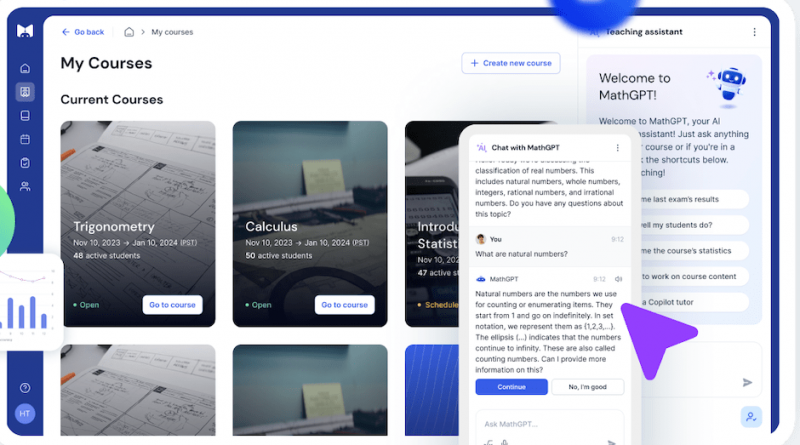MathGPT.ai: The ‘Cheat-Proof’ Tutor and Teaching Assistant Now Available at More Than 50 Institutions
As AI becomes more integrated into the classroom—where students use it for assignments and educators face challenges in managing it—an AI platform called MathGPT.ai was launched last year to offer an “anti-cheating” tutor for college students and a teaching assistant for professors. After a successful pilot program at 30 colleges and universities across the U.S., MathGPT.ai is poised to nearly double its availability this fall, with hundreds of instructors planning to incorporate the tool. Institutions adopting MathGPT.ai include Penn State University, Tufts University, and Liberty University, among others.
The platform’s most notable feature is its AI chatbot, which is designed never to provide direct answers. Instead, it engages students with questions and support, emulating a human tutor. This Socratic questioning approach promotes critical thinking over rote memorization.
For educators, MathGPT.ai serves as a teaching assistant, generating questions and assignments based on uploaded textbooks and learning materials, while also offering auto-grading capabilities and various AI features. It supports college-level mathematics, including Algebra, Calculus, Trigonometry, and more.
In addition to its expansion, MathGPT.ai has rolled out an upgraded version of its platform, introducing new features that grant professors greater control over how students utilize the tools. A key distinguishing feature is its instructor-centric approach, with a focus on meeting the needs of educators. For example, instructors can dictate when students are allowed to engage with the chatbot and specify whether the AI should provide tutoring support for particular assignments while encouraging independent work on others.
Another new feature allows professors to set the maximum number of attempts a student has to answer a question correctly. To encourage a low-pressure learning environment, MathGPT.ai also offers unlimited practice questions, which do not impact students’ scores, enabling them to evaluate their knowledge without the stress of grades.
Additional features for instructors include an optional requirement for students to submit images of their work, allowing professors to review submissions and verify authenticity. Recent updates include integrations with the three largest Learning Management Systems (LMS): Canvas, Blackboard, and Brightspace. The platform has also added screen reader compatibility and an audio mode to improve accessibility for individuals with disabilities. It already provides closed captions for its summarized video lessons, which are uniquely AI-narrated to mimic the voices of historical figures like Ben Franklin and Albert Einstein. The company ensures compliance with the Americans with Disabilities Act (ADA).
While chatbots like Meta AI, Character.AI, and ChatGPT have faced criticism for inappropriate interactions with young users, MathGPT.ai emphasizes that it has implemented strict safeguards to maintain a secure learning environment. “It will not have discussions with you about your girlfriend, boyfriend, or the meaning of life,” said Peter Relan, chairman of MathGPT.ai, in an interview with TechCrunch. “It will simply not engage. These freestanding chatbots tend to go in that direction. We are not here to entertain those types of conversations.” (Relan was instrumental in incubating Got It AI and was an early investor in Discord.)
It’s important to note that, like any chatbot, MathGPT.ai’s assistant may still provide inaccurate information. A disclaimer at the bottom of the chatbot indicates that the AI could make mistakes, and users can report incorrect responses to the company. “If you find a mistake, we will reward you with a gift card for reporting it. In year one, we had five [hallucinations]. In year two, there was one. So far [this year], none. We take this very seriously,” Relan stated, adding that MathGPT.ai employs a team of human annotators to verify the accuracy of all work, textbooks, and other content to ensure “100% accuracy.”
To facilitate its growth, the company plans to develop a mobile app in the future and expand into additional subjects such as chemistry, economics, and accounting. MathGPT.ai offers a free option, as well as a $25 per student per course option. The paid version provides several benefits, including unlimited AI assignments and LMS integration.



